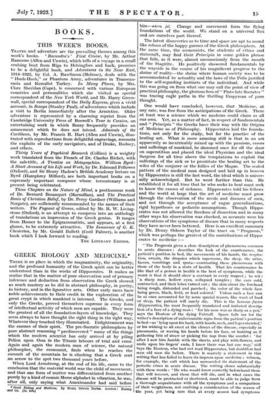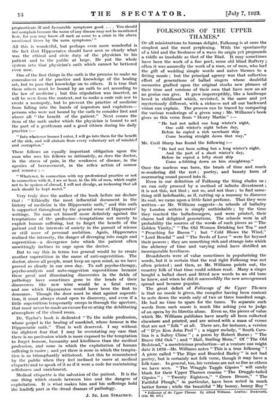GREEK BIOLOGY AND MEDICINE.*
THERE is no place in which the magnanimity, the originality, and the profound humanity of the Greek spirit can be better understood than in the works of Hippocrates. It makes us realize that in the matter of pure observation and of primary inference and deduction from observation the Greek showed as much mastery as he did in abstract philosophy, in poetry, In history, and in the figurative arts. Other early races have noble achievements to their credit in the exploration of the
great es nit in which mankind is interned. The Greeks, and only the Greeks, proved themselves supreme in every form of intellectual activity of which men are capable. They were the greatest of all the foundation-layers of knowledge. They seem always to have thought the right thing in the right way. Whatever they touched they illuminated. Enlightenment was the essence of their spirit. The pre-Socratic philosophers by pure abstract reasoning " prediscovered " many of the things which the modern scientist has only arrived at by piling Pelion upon Ossa in the Titanic labours of trial and error. Again and again the modern man of science, the natural philosopher, the economist, finds when he reaches the summit of the mountain he is climbing that a Greek sent An arrow to the spot two thousand years before.
When Lord Armstrong, at the end of his life, came to the conclusion that the material world was the child of movement, and that one form of matter was differentiated from another purely by a kind of cosmic Morse alphabet in vibration, he was, after all, only saying what Anaximander had said before
•• Greek Biology and Medicine. By Henry Osborn Tasior. London: Ramp and Co. [Is. net.] him—rtivra pei; Change and movement form the flying foundations of the world. We stand on a universal flux and are ourselves part thereof.
The latest discoveries as to time and space are apt to sound like echoes of the happy guesses of the Greek philosophers. At the same time, the economists, the students of ethics and statecraft, may find their Principia in some golden phrase that falls, as it were, almost unconsciously from the mouth of the Stagirite. He positively showered fundamentals by the wayside in the course of his magnificent progress to the shrine of reality—the shrine where human society was to be accommodated to actuality and the laws of the Polls justified to the self-regarding instincts of the individual. And while this was going on from what one may call the point of view of practical philosophy, the glorious firm of" Plato late Socrates" was tracing eagle paths in the thrilling Empyrean of pure thought.
One would have concluded, however, that Medicine, at any rate, was free from the anticipations of the Greek. There at least was a science which we moderns could claim as all our own. Yet, as a matter of fact, in respect of fundamentals and " Prineipia " the Greeks have their way with the Origins of Medicine as of Philosophy. Hippocrates laid the founda- tions, not only for the study, but for the practice of the healing art. What is more amazing still is that in an art apparently so inextricably mixed up with the passions, errors and sufferings of mankind, he slammed once for all the door on superstition and placed the ideal Physician and the ideal Surgeon for all time above the temptations to exploit the sufferings of the sick or to prostitute the healing art to the wiles of the conjurer or the follies of the Magus. The sealed pattern of the medical man designed and laid up in heaven by Hippocrates is still the last word, the ideal which is univer- sally acknowledged. But he went further than this. He established it for all time that he who seeks to heal must seek to know the causes of sickness. Hippocrates told his fellows and the world at large that the art of medicine must grow through the observation of the needs and diseases of men, and not through the acceptance of vague generalizations, rigid hypotheses or pedantic assumptions. Though Hippo- crates was not allowed the freedom of dissection and in many other ways his observation was checked, so accurate were his observations of the symptoms of disease that in many respects they have never been bettered. Here is an excellent summary by Dr. Henry Osborn Taylor of the tract on "Prognosis," which was perhaps the greatest of the contributions of Hippo. crates to medicine :—
" The Prognosis gives a close description of phenomena common to acute diseases : describes the look of the countenance, the patient's position in bed, the movements of his hands, the respira- tion, sweats, the dropsics which supervene, the sleep, the urine, faeces, vomitings and sputa—contrasting these phenomena with those of the body in a state of health. That his countenance be like that of a person in health is the best of symptoms, while the worst is that it should show a contrast in every respect ; to wit : a sharp nose, hollow eyes, collapsed temples ; the cars cold, contracted, and their lobes turned out ; the skin about the forehead being rough, distended and parched ; the color of the whole face being green, black, livid, or lead colored.' Unless such a face can be at once accounted for by some special reason, like want of food or sleep, the patient will surely die. This is the famous facies Hippocralica, the most frequently translated and imitated descrip- tion of a face of a dying man : 'for his nose was as sharp as a pen,' says the Hostess of the dying Falstaff. Space fails me for the writer's description of unfavourable signs from the patient's position in bed—as lying upon his back, with hands, neck, and legs extended,' or his wishing to sit erect at the climax of the disease, especially in pneumonia, or waving his hands before his face, or hunting as it gathering bits of straw or picking the nap from the overlet : for after I saw him fumble with the sheets, and play with flowers, and smile upon his fingers' ends, I knew there was but one way,' still says the Hostess, who had not read Hippocrates, but doubtless had seen old men die before. There is scarcely a statement in this writing that has failed to leave its impress upon medicine : witness, for example, the cult which has surrounded its statement of the periodic crises in acute disease. The writing closes substantially with these words : He who would know correctly beforehand those that will recover, and those that will die, and in what cases the disease will be protracted or shortened, must be able to judge from a thorough acquaintance with all the symptoms and a comparison of their weightiness, not omitting a consideration of the season of the year, yet being sure that at every season bad symptoms
prognosticate ill and favourable symptoms good. . . . You should not complain because the name of any disease may not be mentioned here, for you may know all such as come to a crisis in the above mentioned times by the same symptoms.'" All this is wonderful, but perhaps even more wonderful is the fact that Hippocrates should have seen so clearly what was the ethical and civic duty of the physician to his patient and to the public at large. He put the whole system into that physician's oath which cannot be bettered even now.
One of the first things in the oath is the promise to make no concealment of the practice and knowledge of the healing art, but to pass that knowledge on to others. It is true that these others must be bound by an oath to act according to the law of medicine ; but this stipulation was inserted, as will be seen from the context, not to make a caste rule nor to create a monopoly, but to prevent the practice of medicine from falling into the hands of impostors and exploiters— persons who were not bound by the oath to consider first and above all "the benefit of the patient." Next comes the item of the oath under which the physician is hound to act the part of a gentleman and a good citizen during his daily practice :—
" Into whatever houses I enter, I will go into them for the benefit of the sick, and will abstain from every voluntary act. of mischief and corruption."
There follows an equally important obligation upon the man who sees his fellows so intimately, as does the doctor, in the stress of pain, in the weakness of disease, in the agonies of bereavement, in the reflex action of sorrow and remorse :—
"Whatever, in connection with my professional practice or not in connection with it, I see or hear, in the life of men, which ought not to be spoken of abroad. I will not divulge, as reckoning that all such should be kept secret."
Very truly does the author of the book before me declare that : "Ethically the most influential document in the history of medicine is the Hippocratic oath," and this oath is supported throughout by the general sense of Hippocrates' writings. No man set himself more definitely against the temptations of the profession—temptations not merely to exploit human suffering, but to forget the benefit of the patient and the interests of society in the pursuit of science or still more of personal ambition. Again, Hippocrates realized the intensity, the danger of diverging into magic and superstition—a divergence into which the patient often unwittingly inclines to urge upon the doctor.
But to say this in terms too general would be to create another superstition in the name of anti-superstition. The doctor, above all people, must keep an open mind, as we have proved so clearly in our own day. To call psycho-therapy, psycho-analysis and auto-suggestion superstitions because these great and illuminating discoveries in the fields of pathology have sometimes gone to the heads of their discoverers like new wine would be a fatal error, and one which Hippocrates would have been the first to denounce. Though the door must be shut against supersti- tion, it must always stand open to discovery, and even if a little superstition temporarily creeps in through the aperture, that must never be made an excuse for creating the debilitating atmosphere of the closed room.
Dr. Taylor's book is dedicated "To the noble profession, whose gospel is the healing of mankind, whose honour is the Hippocratic oath." That is well deserved. I say without the slightest fear that I may be overstating my case that there is no profession which is more exposed to the temptation to forget honour, humanity and kindliness than the medical profession, and none in which the exploitation of human suffering is easier ; and yet there is none in which the tempta- tion is so triumphantly withstood. Let this be remembered by the public when they feel inclined to sneer at medical etiquette and to speak of it as if it were a code for maintaining selfishness and enrichment.
Medical etiquette is the salvation of the patient. It is the one thing which stands between him and the dangers of exploitation. It is what makes him and his sufferings hold the leadirfg part in the dread dramas of pathology.
J. Sr. LOE STRACHEY.















































 Previous page
Previous page